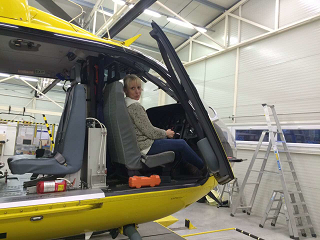Günter Kosche
Interview with Günter Kosche
by Galambosné Fejér Gabriella
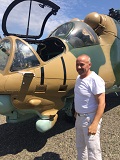
When you see a yellow helicopter above, have you ever asked yourself the question, “What is it like to work as a medicopter pilot?” or been curious about what has happened? I am sure you’ve got the point: there must have been a big accident.
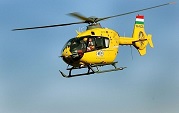
In this interview with Günter, he answers a few questions that I myself have wondered, and questions that many others are curious to know more about as well.
 Senior Pilot, Captain Günter Kosche, 54, has been flying for 28 years. At present, he works for the Magyar Légimentő Nonprofit Kft.
Senior Pilot, Captain Günter Kosche, 54, has been flying for 28 years. At present, he works for the Magyar Légimentő Nonprofit Kft.
Why did you choose to pilot helicopters rather than airplanes?
When I was young I remember watching movies like “Top Gun” and “Iron Eagle” and being fascinated by flying. I like everything that flies, but to be honest, I made the decision when I signed up to learn how to fly in college. I haven’t regretted my choice for a second!
How did you become a pilot? Did you always want to be a pilot and what was your career path to becoming a pilot?
I was born and raised in Berlin. I grew up playing lots of sports and enjoyed all things outdoors. I attended the US Air Force Academy in Colorado Springs. Upon graduation, I attended Undergraduate Pilot Training at Vance in Enid.
After logging over 200 hours in the T-1 Jayhawk, I earned my wings to begin my career as a pilot.
Has being a professional helicopter pilot changed your life?
Being a helicopter pilot requires a lot of autonomy and my work as Head Pilot requires rigorousness. I think people see pilots as being trustworthy, and these are qualities that I have improved upon thanks to my profession.
When did you leave the army to become Medicopter Pilot and why?
In 2010, I left the army. Well, I retired. But flying is a part of me. So when they offered me to work for the medical company, I hardly hesitated. It is true that this job is different, but flying a copter will always be my passion.
Are there any parallels between the military and medicopter?
The trend in contemporary aviation is to enhance safety by implementing the Safety Management System. This trend has also become a part of the medical rotary industry. As a part of the SMS, flight safety training is included, which consist of human factors, crew resource management training and the creation/shaping of attitudes and safety culture. During 2012, the SMS was implemented by Scandinavian MediCopter AB. This study attempts to discover if the implementation of the FST tool in the SMS has an effect on how professional aviators speak about safety and how the training curriculum is affected.
As a part of such a change, the SMS helps people to have a more open and transparent approach to safety and increase incident/accident reporting. Changes in the curriculum are connected to other aspects, like authority and customer requirements. Additionally, the SMS reporting actually feels less bureaucratic.
What is the best part of the job?
For me it is two things: Beside flying – of course – knowing that you have made a valuable contribution every time you fly. And saving lives are unforgettable moments.
What is the worst part of the job?
Being away from family so often.
What’s a typical work week like?
We are on duty around four or five days a week. But the number of our flying hours depends of the number of the accidents.
People think that if they have seen a yellow copter, a big catastrophe could have happened.
Yeah, I know. But this is a common mistake. Rescue by a helicopter instead by an ambulance differs in only 3 main things. First of all – of course – the speed. There are seven medicopter bases in Hungary, so we can be anywhere in maximum 15 minutes.
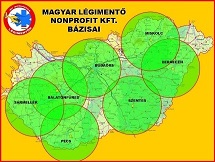
Secondly comes the higher quality of health care. Because – and here comes the third main point – we have a doctor on board with us. And there are no doctors in a normal ambulance.
And yes, we can get – nearly – everywhere.
If there is enough room for landing.
Sure. 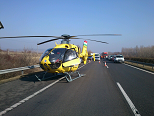
And if the weather is ok.
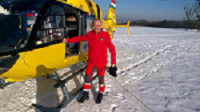
What does a normal day look like when you are a pilot?
A typical day at work starts with preparations at home, putting on my uniform and driving to the airport. Normally, I need to arrive in our so-called “crew room” at the airport one hour before the scheduled departure time.
Once I’m in the crew room I log onto a computer and start printing road maps, weather forecasts and other information necessary to conduct the flight The roadmaps cover the flight route to be flown, how much fuel is required, flight time, etc. Weather information covers the general destination, alternate airports near your destination, and even airports on the way there.
Other information may be about turbulence, winds and so-called NOTAM (Notice to Airmen). This must be reviewed carefully so that you have a good overview of what the day will look like and what to expect.
As a pilot, what question do you get asked the most?
"Don't you get scared?"
Are you ever nervous?
I wouldn’t say I’m nervous. It’s probably the wrong choice of words; it has such a negative tone. Some days you’ll, of course, meet tougher situations. During days with challenging airports and weather conditions, it’s very important to stay extra alert. Everything comes down to having good communication with your colleagues, discussing possibilities and making a good decision together. This lays the foundation for a calm and harmonic work environment, even in more challenging situations.
Top flying tip?
Organization is the key to success. Never leave the ground without fully planning your trip, even if it's just a short flight in your local area.
What's the best piece of flying advice given to you?
Enjoy the moment because when it stops you need to move on.
What do you love about your job?
Well, you get the best office view in the world. Every day is different with a new challenge. I love travelling, having an adventure and enjoying the solitude that the cockpit gives. I don't enjoy a 9-5 job, so this career gives me the lifestyle I so desire.
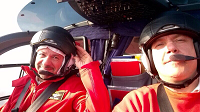
What advice would you pass on to someone who wants to be a pilot?
Motivation and determination are required to complete the training. You need to work well under pressure, be a good communicator and demonstrate leadership qualities. Lastly, my passion for flying superseded any major hurdles!
If someone wants to become a pilot, how should they prepare for the most? What’s the best route into the job?
For preparation I would say do well in school and be a well-balanced person. Pilots are known for being able think well under stress and multi-task. Playing sports is one of the best ways to develop these attributes.
At the Academy, if you want to fly and are medically qualified, chances are extremely high you will get a slot.
Thank you for your time, Günter, and have a safe flight!
